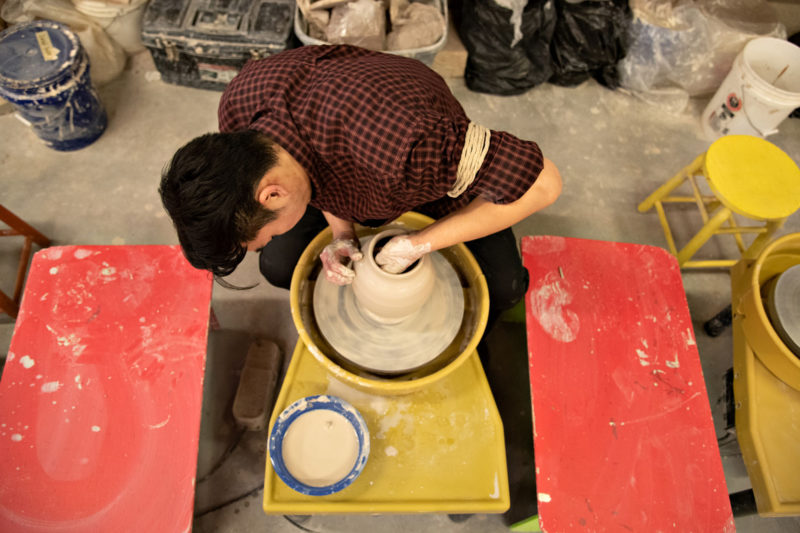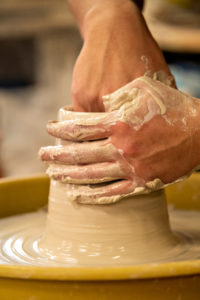
Madi Shea ’22 didn’t think she’d enjoy the religion class she had scheduled for the Fall 2021 semester, but that was before she met her professor, Dr. Bosco Bae.
Bae, a visiting assistant professor in the religious studies department, taught four classes last fall, including Religion, Body, and Health, a class Shea took to go along with her exercise physiology major and sports medicine minor.
By the time the semester was over, Shea concluded it was one of the best courses she had ever taken at the University of Lynchburg, in large part because of Bae. “He is a very open-discussion-based teacher and he allows for everyone’s opinions to be heard,” the Hanover, Pennsylvania, resident said.
“One takeaway I got from this course was how to look at everything with a more open mind. Coming into the semester, I did not think I was going to like taking a religion course, but it ended up being one of my favorite courses I have taken.”
The experience also led Shea, then-president of the University’s chapter of The National Society of Leadership and Success, Sigma Alpha Pi, to nominate Bae for an NSLS Impact Leader Award. Bae was one of several faculty and staff to receive the award last fall.
“I nominated him because of how much he cares for his students, inside and outside of the class,” Shea said. “Everyone always has very positive things to say about Dr. Bosco, and he has impacted a lot of students.
“He always checks up on students if they are absent from class, to make sure they are OK. At the beginning of every class, he always asks how we are doing and if we need anything. At the beginning of the semester, he always asks us what we would like to talk about in the course, and he found a way to incorporate everyone’s ideas.”
Bae arrived on campus in June 2021 and immediately began making what Dr. Amy Merrill Willis, chair of the religious studies department, called a “big impact on the community” — not only the campus community, but the city of Lynchburg as well.

In addition to teaching religion courses full time, Bae teaches pottery at the Academy Center of the Arts in downtown Lynchburg. “One of the first things I do when I move anywhere is look for a pottery studio,” Bae said, adding that he first enrolled in an independent studio class at the Academy but was later asked if he would like to teach.
Asked what he loves most about pottery, Bae said, “I started my conversation with clay and the wheel in 1998. They have since been indispensable interlocutors, teachers, and companions. There really is so much to love about making pottery on the wheel that I’m not exactly sure where to start. The question feels analogous to asking what one loves about a life partner.
“So, in a similar vein, I would say that pottery keeps me humble and lets me know when I’m not. The process continuously provides insights and life lessons, and it unabashedly reflects and tells me about my state of being.
“Different clay bodies also have different tactile expressions, so you learn to converse, adapt, and engage in various ways through touch. The process of working on the wheel is truly absorbing, therapeutic, almost hypnotic, and — perhaps more importantly — allows me to be creative, grow, explore, and become a better person, a better potter.

“It’s a process of discovering and rediscovering a relational and extended sense of self.”
While at the University, Bae has also continued to volunteer as a research associate with the Centre for Mediation in Africa, based in the political science department at the University of Pretoria in South Africa.
His work there stems from a postdoctoral fellowship he did with Pretoria’s Human Economy Programme, which led to the 2021 publication of “Conflict Mediation and Bungoma Activism in a South African Township” in the Journal of Religion in Africa.
“More specifically, what really got me involved with the political science department was the fieldwork I did in the township of Alexandra with sangomas, or African traditional healers, and what they were doing to alleviate and reduce conflict at a communal level,” Bae explained.
“My work with sangomas and local forms of conflict resolution also led to my involvement with a project on community courts in Namibia and some preliminary work in Nigeria.”
Bae’s work in Namibia led him to co-author a chapter for “African Feminisms and Women in the Context of Justice in Southern Africa,” a 2022 book volume edited by Dr. Cori Wielenga, acting director of the Centre for Mediation in Africa.
Bae’s journey to Lynchburg started 38 years ago in Korea, although Bae will say that he’s 40 “by Korean convention.” When he was about a year old, he and his parents immigrated to Salt Lake City, where his dad would earn his PhD at the University of Utah.
“At a young age, with very little money, practically no English, no family or social network, and a baby in arms, they made a difficult, life-altering decision to migrate to a completely foreign country,” Bae said.
“My brother was born in Salt Lake City. We grew up going back and forth between Salt Lake City and Korea. A couple years here, a couple years there. Back and forth, back and forth.”
Bae said his family’s story “present[s] critiques as well as exaltations of U.S. and Korean society which are intimately entangled with issues of identity, race, belonging, and its cross sections with economics, farce meritocracies, culture, and religion.
“If I may bracket such complexities and densely knotted issues of entangled concern, my mother is now an instructor of Korean ink painting at the Osher Lifelong Learning Institute at the University of Utah. My father is also employed at the University of Utah as a distinguished professor and is well-known within his field.
“My brother … was a professional artist, community organizer, and adjunct assistant professor at the School of the Art Institute of Chicago as well as the University of Illinois-Chicago. I am very blessed to have such awesome family members.”
Bae earned a bachelor’s degree in philosophy and psychology at Boston University, and a second BA in anthropology at the University of Utah. For his master’s in philosophy, he went to the University of Amsterdam in the Netherlands. He earned a PhD in interdisciplinary study of religion from the University of Durham in the United Kingdom.
While earning his degrees, he taught and worked as a research assistant in Utah, Korea, and the UK. After receiving his PhD, he went to South Africa, where he did fieldwork and research at universities in Pretoria and Johannesburg, and was an advisor and board member for the Buyisa Soul and Spiritual Centre.
When Bae saw Lynchburg’s advertisement for a visiting religious studies professor, he was working as a behavioral health technician at a Salt Lake City psychiatric hospital. “I worked the acute and sub-acute units from time to time, but was mostly with the residential treatment center, which focused on adolescent boys who were at the hospital for extended periods of time,” he said.
“I worked a similar job before and wanted to see the extent in which the mental health industry had changed. COVID-induced circumstances really forced my hand to get a ‘jobby job’ and I knew the psychiatric hospital could keep my interest on several levels.”
In his first semester at Lynchburg, Bae taught four classes: Religion, Body, and Health; Comparative Religious Ethics; Religions of Asia; and Judaism, Christianity, and Islam. Similar to Shea’s experience, the semester also was notable for Bae.
“[It] was revealing and very much a learning experience,” Bae said. “As much as students learn from their teachers, we also learn from students. Education and learning are lifelong endeavors in the process of understanding our humanity and becoming human. We cease to grow when we cease to learn.”
Asked about his students at Lynchburg, Bae said he thinks they “comprise a considerable sample of futures in the United States. There is much to endear and much to be critical about the student body.
“And yet, as American pragmatist John Dewey argued, democracy requires education to not only inform and elevate our collective and organized intelligence, but education must also prepare students for uncertainties in the future.
“In this sense, there is a kind of pedagogical responsibility in the challenge and task of developing our democracy and levels of civil engagement.”
Bae is a visiting professor, here on a one-year contract, but he hopes his time at Lynchburg won’t end with Commencement.
“There are a lot of good reasons to stay,” he said. “Apart from personal lifestyle preferences and access, I’m becoming much more fascinated by the history of Lynchburg and its current inflections in the city, from the Monacan nation, early settler colonialists, slavery, the Civil War, the city’s proximity with the Black Radical Tradition, up to the impact of Jerry Falwell.
“Lynchburg retains a striking microcosm that reflects a macro significance within U.S. history and contemporary society. For a study of religion scholar, Lynchburg is a trove for the archaeology of knowledge in the humanities and social sciences.
“The rabbit hole runs deep here. I’d love the opportunity to dig deeper and help elevate the University of Lynchburg.”

